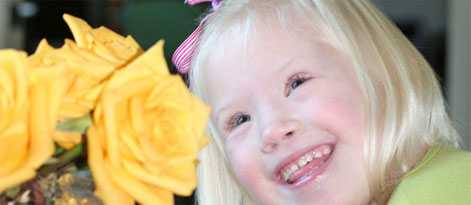

Down Syndrome is named after Dr. John Langdon Down, an English physician who first described the characteristic features of Down Syndrome in 1866. "Down Syndrome" is used, as opposed to "Down's Syndrome", because it was named after Dr. Down.
Down Syndrome is the most common chromosomal variation in humans. It occurs in approximately 1 in every 733 live births. There are between 350,000 to 400,000 people with Down Syndrome in the United States. It is not related to race, nationality, religion, or socio-economic status. Nothing that a parent did or did not do during the pregnancy causes a baby to have Down Syndrome. While the age of the mother can be a factor, 80% of people with Down Syndrome are born to parents under the age of 35, simply because women in that age group have the most babies. Down Syndrome occurs evenly in male and female babies.
For an unexplained reason in cell development, each cell results in 47 instead of the usual 46 chromosomes. The resulting medical diagnosis is Down Syndrome and is generally diagnosed as Trisomy 21, which describes the presence of all or part of an extra 21st chromosome. This extra genetic material causes changes in the orderly development of the body and brain, as well as the physical characteristics and delayed physical, intellectual, and language development associated with Down Syndrome.
People with Down Syndrome are more like their typically-developing peers than they are different. There is great diversity within the population in terms of personality, intelligence, appearance, humor, learning styles, compassion, compliance and attitude. Although they may share characteristics and similarities in appearance, children with Down Syndrome will look more like their family members than they do one another. They will have a full range of emotions and attitudes, are creative and imaginative in play, and grow up to live independent lives with varying degrees of support and accommodations.
Individuals with Down Syndrome will establish friendships, pursue interests, and be included in community activities. Children with Down Syndrome benefit from the same care, attention, and inclusion in community life that help every student grow. As with all children, quality education in neighborhood schools, preschools, and at home is important to provide the opportunities needed to develop strong academic and social skills.

